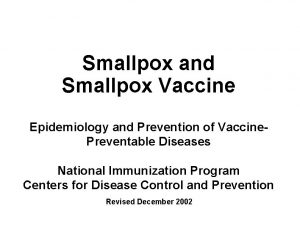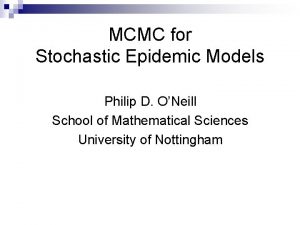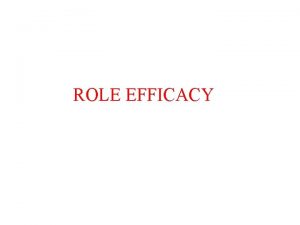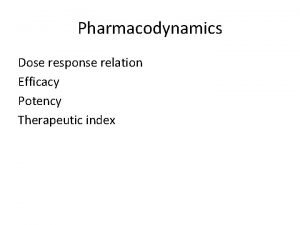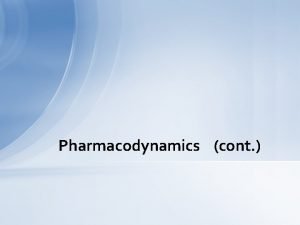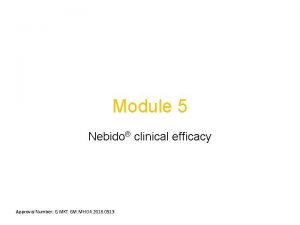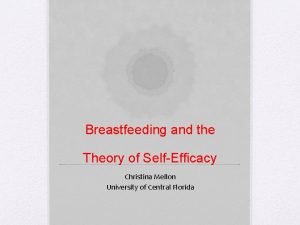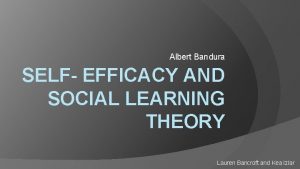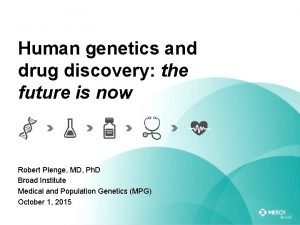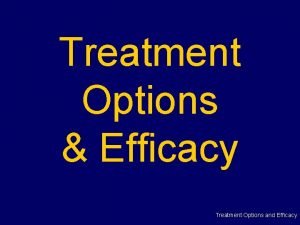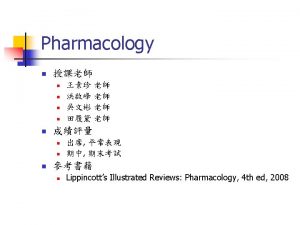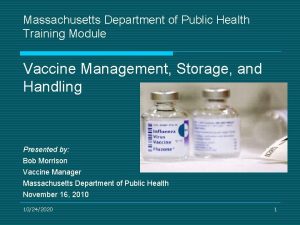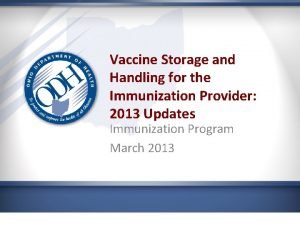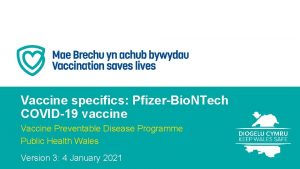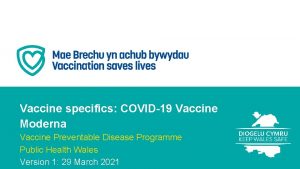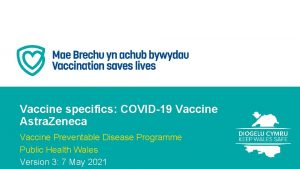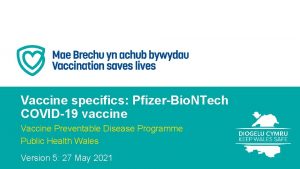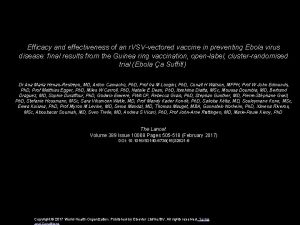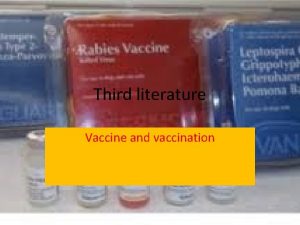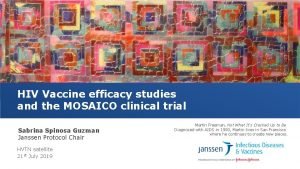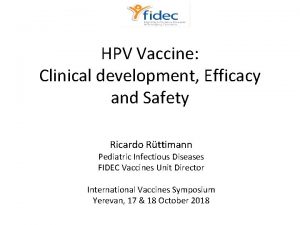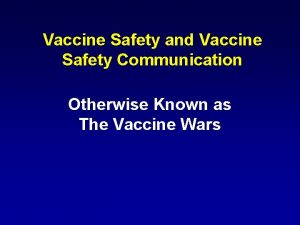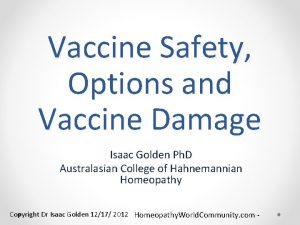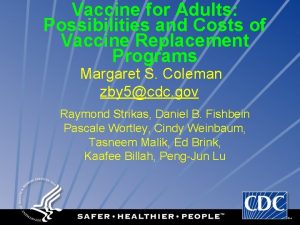Vaccine Efficacy Effectiveness and Impact G HANQUET KCE





















- Slides: 21

Vaccine Efficacy, Effectiveness and Impact G. HANQUET, KCE, 9 September 2017 Rv. B - CA, 16/09/2014

Outline § § § 2 The confusion Vaccine effects Methodologies Challenges Implications for decision making

Life cycle of vaccines "Prior to licensure, a vaccine must demonstrate its safety and efficacy in phased clinical trials. Postlicensure, continued close monitoring of the vaccine safety and effectiveness is needed" Chen (WHO), 1996 "WHO recommends an assessment of the impact of programme-based introduction (of PCV or Hib. CV)" WHO, 2012 3

Efficacy, effectiveness or impact?

Existing definitions

Vaccine effects § Direct effect: § Protection in vaccinated persons only § Induced by individual vaccination § Indirect effect: § Effect of a vaccination programme § At population level, including non-vaccinated

Direct effect § Depends on vaccine and host characteristics § Compares disease in vaccinated to disease in and unvaccinated in one population § Measured in clinical trials or in real life § Efficacy: protection measured in clinical trials § Ideal conditions of administration § Selected subjects (e. g. underlying diseases often excluded) § Effectiveness: protection if measured in real life situation § Routine vaccination, including incomplete schedule, delayed administration § Any person of the target group

Herd effects or indirect Effect of widespread vaccination: protection by reduced transmission in the population, when large proportions are vaccinated

Two vaccine exposures § Individual vaccination Direct effect only § Vaccination programme Direct + indirect efect Effect of programme > sum of effects of vaccination on vaccinated • If there is an indirect effect

How to measure vaccine effects? Adapted from Halloran et al.

Direct effect of vaccination on those vaccinated n Exposure = individual vaccination n Vaccinated vs. non vaccinated, same population Methods: study design must cancel the indirect effect of programme: n n 1819 Janu cohort studies (from same population) Same population case control studies Controls have same screening methods exposure/coverage than population giving rise to Broome method cases

An example of direct effect § Case control for influenza vaccines Valenciano Vaccine 2010 and Pebody Eurosurv 2016 12

Indirect, total and overall effect Comparing two separate but similar populations, one with vaccination, the other without: § Vaccinated persons: total effect § Non-vaccinated: indirect effect § All persons: overall effect Design: Exposure = programme 1819 Janu § Population separated by time or place § Pre and post-vaccine comparison (time) § Cluster randomized trials § Statistical or mathematical modelling

Impact of vaccination programme WHO: correspond to overall effect Vaccination programme Total population being compared Hanquet, Vaccine 2011

Major confusion: direct and overall Direct effect Overall effect of individual vaccination of a vaccination programme on vaccinated persons in a population, in which a fraction only is vaccinated Pre or post-licensure Post-licensure only Does not include indirect effect Direct + indirect effects Potentially replacement disease Compares groups from same population Compares 2 populations Need to know vaccine status No need to know vaccine status For PCV 7, in clinical trials: • 94 -97% on vaccine types • 89% on all IPD cases Whitney NEJM 2003 For PCV 7, in US in <2 years: • 78% on vaccine types • 69% on all IPD Black PIDJ 2000

Efficacy, effectiveness or impact? Vaccinated vs unvaccinated, same population § In clinical trials § In real life setting § In observational studies Two populations: one vaccinated vs other unvaccinated Measured in: - vaccinated: total - non-vaccinated: indirect - all: overall

Methodological challenges Assumption: "all other things being equal" Same distribution among vaccinated and non-vaccinated - Equal probability to be exposed to infection - Equal susceptibility to the disease: probability of being vaccinated independent from the probability of developing the disease - Equal probability to be detected and reported When comparing two populations, they should have: - Similar baseline transmission Similar characteristics of population and cases Similar medical practices / other interventions Similar case detection, reporting and data collection Part of confounders can be adressed by adjustment in analysis G.

An example: rotavirus

Implication for decision making For vaccine authorisation (efficacy) First information available when deciding to introduce a vaccine Depends on: 1. The vaccine • Type of vaccine • Vaccine schedule and age 2. The host: • Immune response • Pre-existing immunity 18 - Represent the real public health benefit To achieve wide reduction of disease To protect population not responding well (elderly, neonates) Depend on: 1. The vaccination programme: • Type of vaccine (prevents transmission) • Proportion vaccinated (uptake) • Vaccine schedule (number doses) and age 2. The population: • Social contact patterns, high transmitters 3. The pathogen: • Modes and intensity of transmission

Conclusions 1. The type of effect to measure depends on the question § Regulatory (efficacy) vs. public health decision (impact) 2. Direct effect is the main information when deciding on a vaccine, but overall effect represents best the public health benefit of a vaccination programme 3. Effectiveness and impact measures are less robust than efficacy, but more representative of the real life 4. To know which effect has been measured in a study, need to assess which populations and groups are being compared 18 -

Thank you 21
 Vaccine efficacy
Vaccine efficacy Vaccine efficacy
Vaccine efficacy Isabelle hanquet
Isabelle hanquet Self efficacy definition
Self efficacy definition What is role efficacy
What is role efficacy Therapeutic index
Therapeutic index Potency vs efficacy
Potency vs efficacy Nebido efficacy
Nebido efficacy Optimal self confidence
Optimal self confidence Christina mellon
Christina mellon Collective teacher efficacy
Collective teacher efficacy Collective teacher efficacy
Collective teacher efficacy Collective teacher efficacy
Collective teacher efficacy Albert bandura self-efficacy
Albert bandura self-efficacy Drug efficacy
Drug efficacy Luminous efficacy comparison chart
Luminous efficacy comparison chart Drug efficacy
Drug efficacy Slidetodoc.com
Slidetodoc.com Efficacy potency
Efficacy potency Vaccine storage and handling sop worksheet
Vaccine storage and handling sop worksheet Vaccine storage and handling protocol
Vaccine storage and handling protocol The effectiveness of online and blended learning
The effectiveness of online and blended learning
